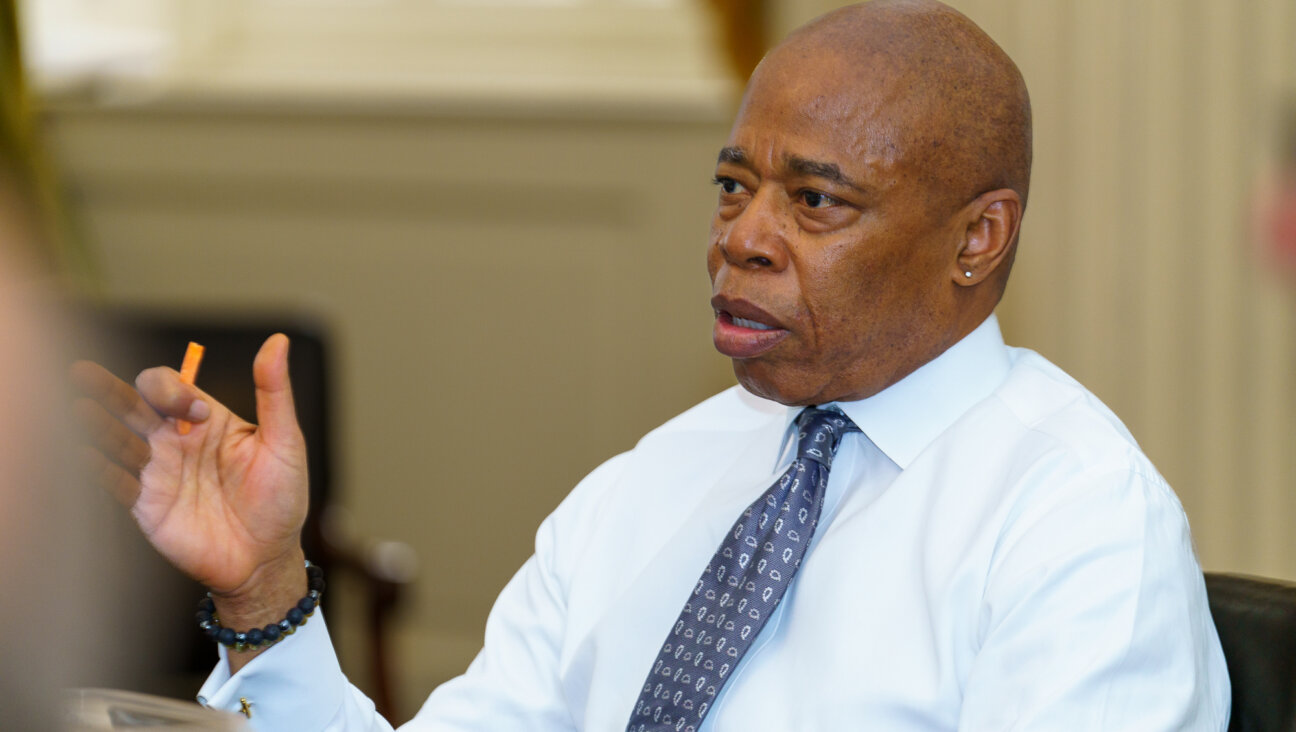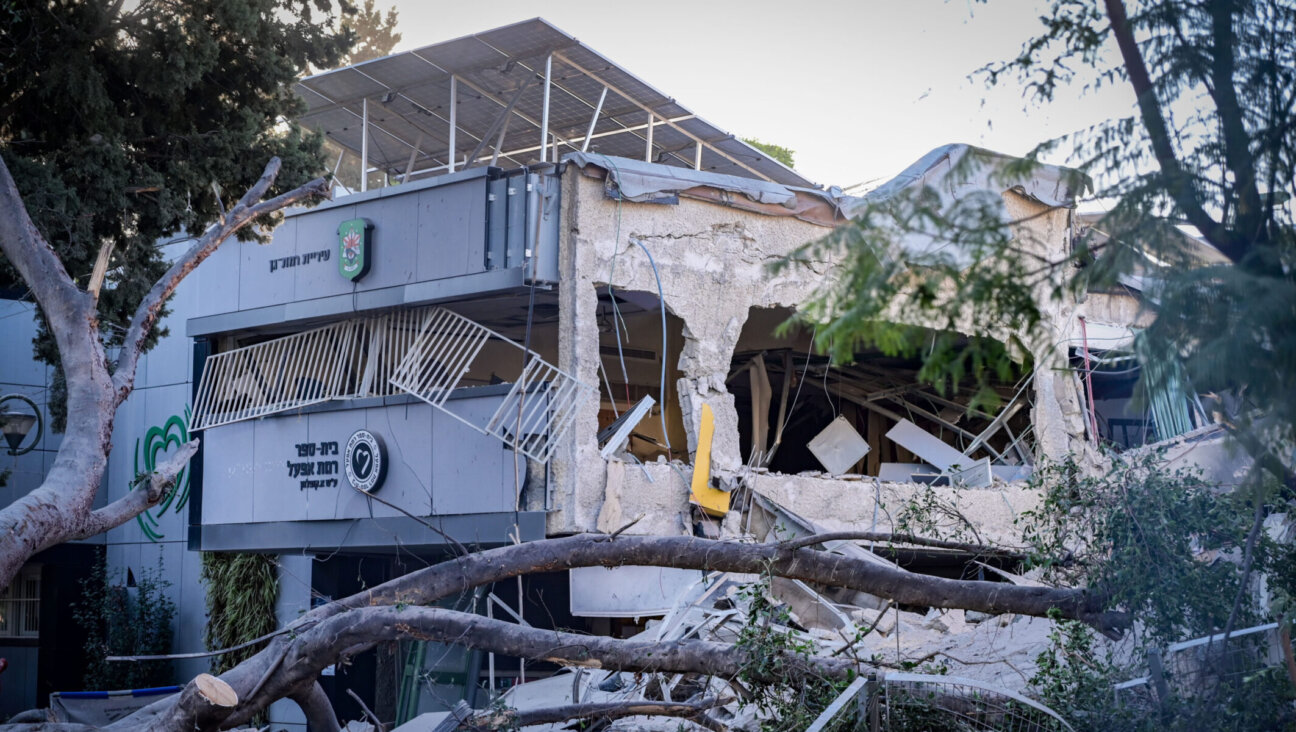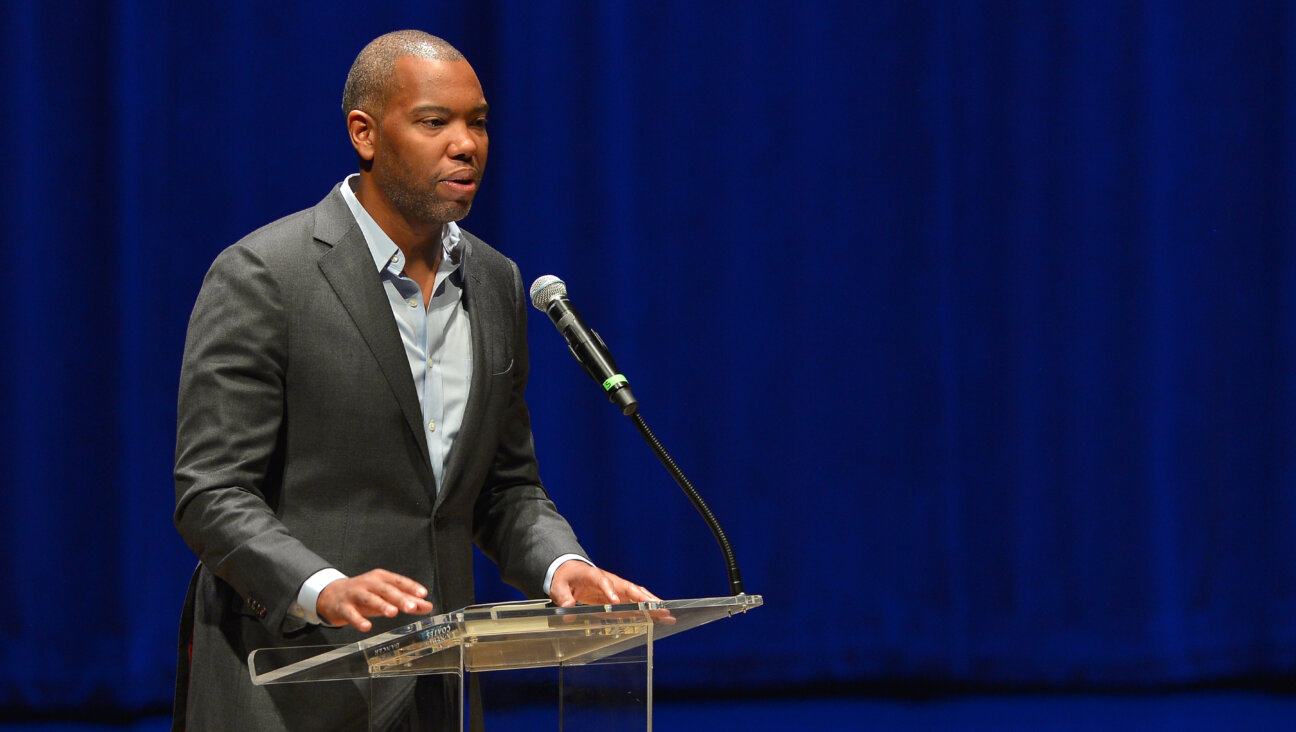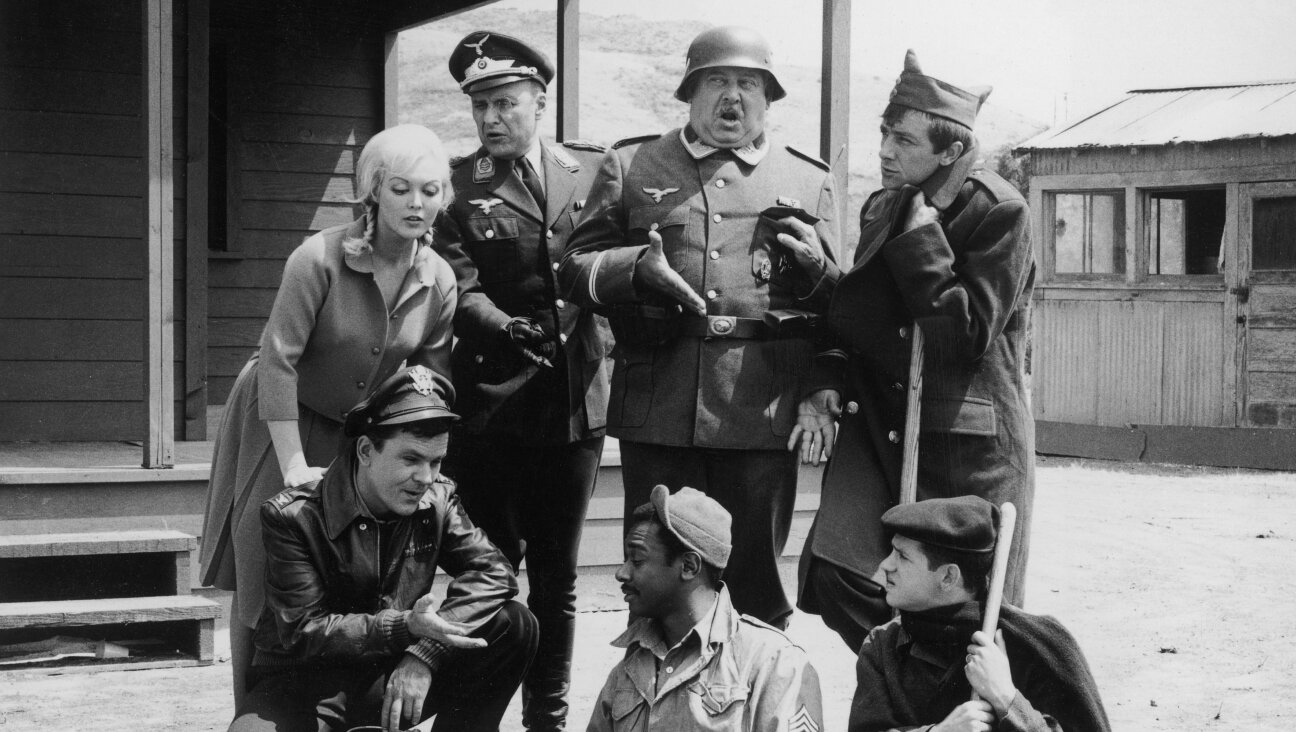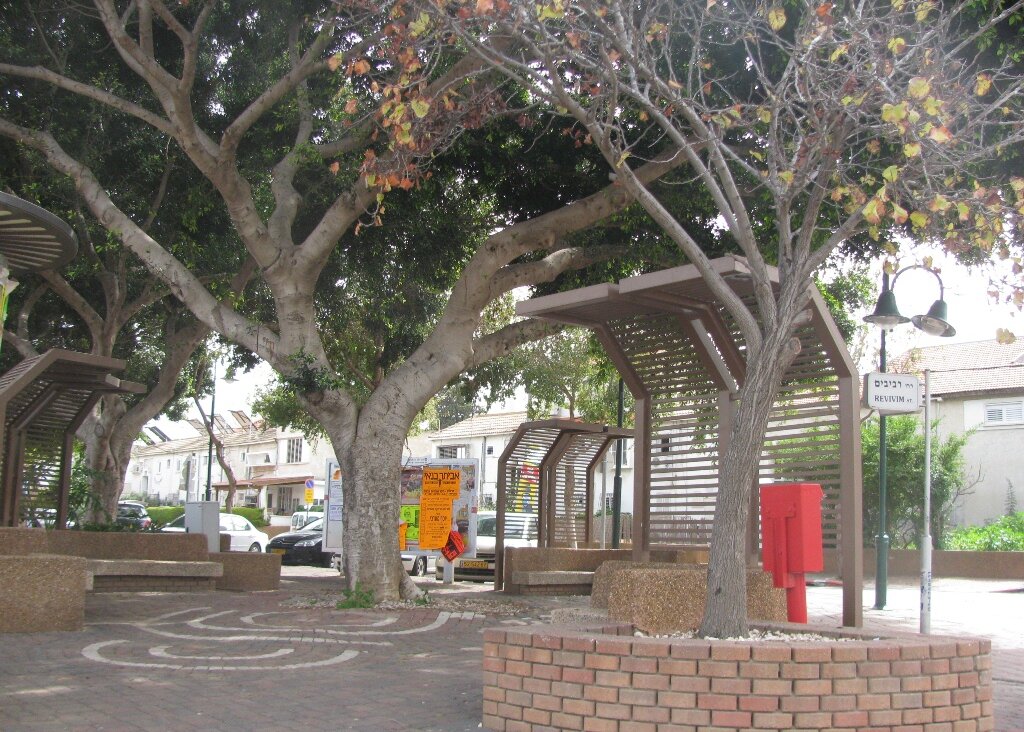Yonkers City Council tables a ceasefire resolution that both pro-Palestinian and pro-Israel groups opposed
The resolution aimed to thread a narrow needle, calling for a ceasefire in the Israel-Hamas war while also defending Israel’s right to exist
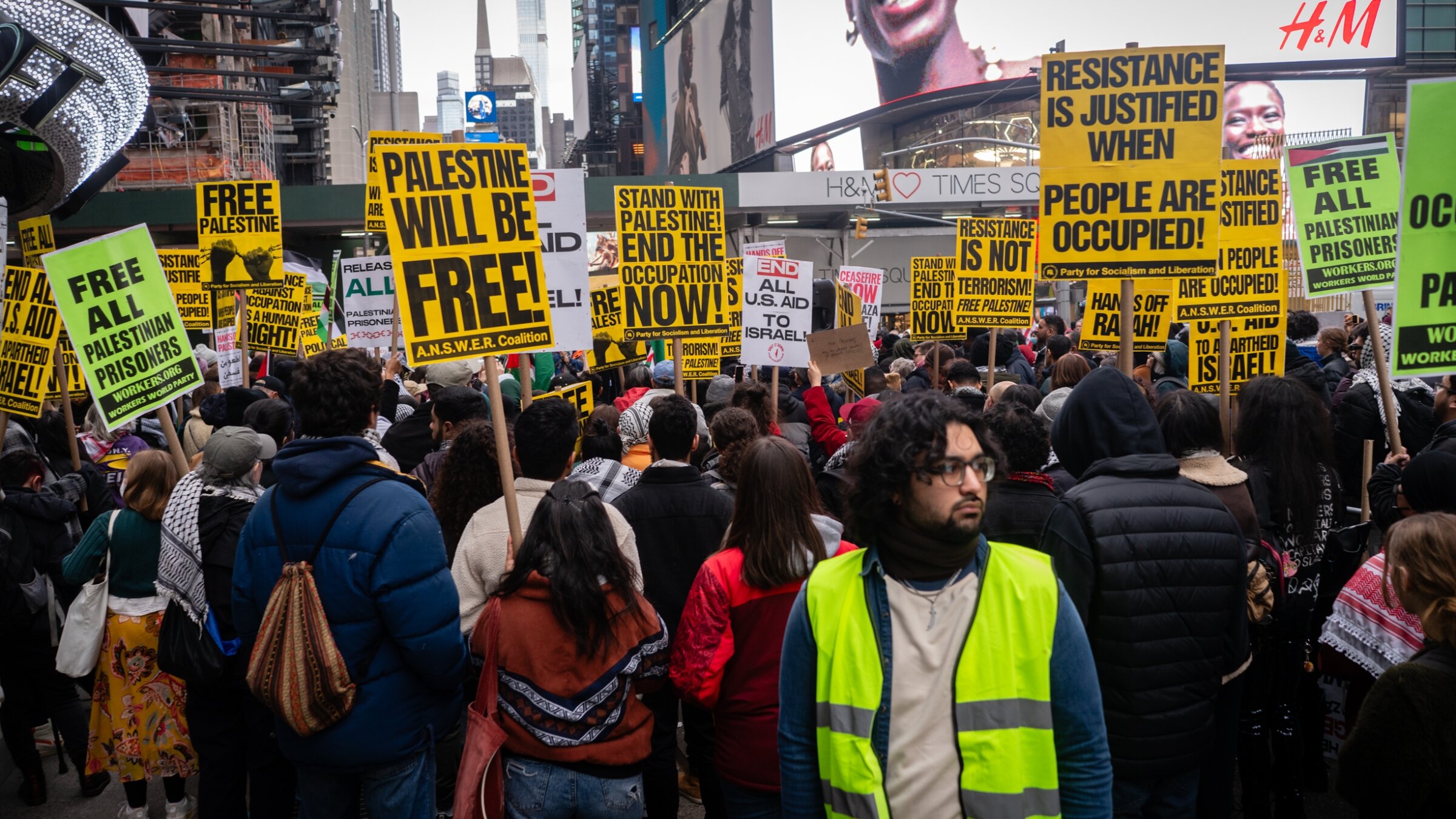
Pro-Palestinian demonstrators near Times Square in New York City, April 5, 2024. (Luke Tress)
(New York Jewish Week) — After months of discussions and weeks of debate, the Yonkers City Council has tabled a Gaza ceasefire resolution that aimed to thread a narrow needle — calling for an end to the Israel-Hamas war while also defending Israel’s right to exist.
The council announced that it would table the resolution at the start of the meeting Tuesday evening when it had been on the agenda. The tabling followed opposition from all sides in Yonkers.
Despite having called for months for a ceasefire, a coalition of pro-Palestinian organizations, including an anti-Zionist Jewish group, protested the proposed resolution. The Yonkers Ceasefire Coalition called it a “Zionist resolution,” condemned it as a “distorted version of the original resolution that appears to minimize the severity of the atrocities” and put forward its own draft that removes language recognizing Israel’s right to exist.
Meanwhile, a deluge of emails from Jewish residents had also filled the council’s inbox protesting the move to call for a ceasefire at all.
Both groups announced their intention to protest during the meeting — leaving the council unwilling to proceed with the resolution.
“My position is, if the group that asked for the resolution does not support it because it doesn’t go as far as they want, and the Jewish community does not support it because they don’t want a ceasefire without the release of hostages, which is totally understandable, then why are we bringing this to a vote?” City Council President Lakisha Collins-Bellamy told the New York Jewish Week before the meeting.
The dispute over the resolution in a large New York City suburb reflects shifting rhetoric surrounding the Israel-Hamas war six months after it began on Oct. 7 with Hamas’ invasion of Israel. A number of cities have passed ceasefire resolutions. But while competing texts have been put before some city councils, the debates until now have mainly focused on whether or not to call for a ceasefire.
The Yonkers debate, by contrast, comes at a time when calls to stop or at least immediately pause the fighting have gained increasing purchase among U.S. lawmakers as well as left-wing pro-Israel groups. Jewish groups on the center and right have generally opposed ceasefire calls. Israel and Hamas have been engaging in indirect talks over a ceasefire for months; this week, Hamas again rejected an Israeli proposal for a pause in the fighting.
Collins-Bellamy said that in addition to the pro-Palestinian protest, members of the Jewish community had sent around 1,000 emails to the City Council opposing the measure. Thirty Yonkers community members signed up to speak at the council meeting and Collins-Bellamy believed planned to oppose the resolution.
The draft that the council would have considered was in line with the stance of left-wing Jewish groups and many Democratic officials, who have stood behind Israel’s right to exist while increasingly opposing the continuation of the war.
The draft resolution holds Hamas responsible for the outbreak of the conflict due to its devastating Oct. 7 attack, decries the “unjust captivity” of more than 100 remaining Israeli hostages; mourns the killing of Israelis; and recognizes the right of Israelis to “live in Israel in peace and the existence of the democratic Jewish state.”
The text also acknowledges the tens of thousands of Palestinians killed and injured, enumerates a right to Palestinian self-determination and calls for an end to the suffering and displacement in Gaza.
“The City Council of Yonkers believes that all human life is precious,” the resolution says. “We acknowledge the immediate need for a ceasefire,” it continues, adding calls to facilitate humanitarian aid, return the hostages, and halt the displacement and violence against Palestinians.
Collins-Bellamy said “the tide has shifted” since the start of the war, when supporters of Israel were more firmly behind Israel’s effort to fight back. The mounting civilian death toll “tugs at people’s heartstrings,” she said, and a growing number of Democratic lawmakers have endorsed a ceasefire.
“They made it OK as opposed to taboo to say, ‘Hey, Israel, maybe we even take a temporary break to get the hostages released and get some humanitarian aid in there,’” she said.
Collins-Bellamy said the council had been approached by the pro-Palestinian activists about a ceasefire resolution in January. Collins-Bellamy said she had little knowledge of the conflict at that point and began to do research to formulate a resolution. But successive drafts floated by the council were rejected by the activist group.
“They still are opposing it because it is not the version that they drafted,” Collins-Bellamy told the New York Jewish Week on Tuesday, adding that the alternate resolution the pro-Palestinian coalition drafted would likely only receive two votes on the seven-seat council.
“I asked them, ‘Do you want a resolution that says explicitly what you asked for but will be voted down?’” she said. “We are absolutely condemning Hamas and they don’t want us to go that route and they want us to use language that is more harsh toward Israel.”
This week, the activists called to “flood” the city hall in protest ahead of the vote, using a term commonly employed by pro-Palestinian activists that echoes Hamas’ name for the Oct. 7 attack, “Al-Aqsa Flood.”
The campaign is led by a group called the Yonkers Ceasefire Coalition that includes Jewish Voice for Peace Westchester, an anti-Zionist group; the local chapter of Democratic Socialists of America; Westchester for Palestine; and WESPAC, a nonprofit that facilitates funding for prominent pro-Palestinian groups around the United States.
Hadil Sam, an activist with the group, said the coalition had gone back and forth with the City Council over the resolution’s text for months and had offered alternatives.
“They went with one that is very biased and does not represent the community,” Sam told the New York Jewish Week. “They don’t really want to work with us, they just want to put something out there that says ‘ceasefire.’”
The activists took issue with the city council’s call to recognize Israel’s existence, saying the demand would “force Palestinians to accept their status as non-citizens, second-class citizens, and refugees in their own land, with no national rights and no right of return.” Arab citizens of Israel have equal rights under law, though many have protested discrimination. Most Israelis view advocacy for a Palestinian right of return as tantamount to calling for the end of Israel as a Jewish-majority state.
The pro-Palestinian activists also objected to blaming Hamas for the outbreak of the conflict and not calling for the “release of Palestinian hostages” — an apparent reference to prisoners detained by Israeli forces on security offenses. Sam said the group also objected to the draft’s leaving out an “explicit description of the violence that Israel has been committing.”
Sam said the statement supporting Israel’s existence was outside the scope of the resolution, and that she felt the clause in support of Palestinian self-determination was insufficient because it focused on only Gaza.
“This is a ceasefire resolution, we’re not talking about declaring states,” Sam said.
The alternate resolution from the coalition, drafted last week, calls to “recognize the rights of Palestinians and Israelis to live with respect, dignity, freedom, and self-determination”; focuses more extensively on Palestinian casualties; condemns the killing of civilians and “collective punishment”; urges the release of hostages and Palestinian political prisoners; and calls for a permanent ceasefire.
The Westchester Jewish Council issued a “call to action” urging followers to gather outside City Hall, around the same time pro-Palestinian activists planned to at the same location.
One of the people who signed up to speak on behalf of Jewish council was Rabbi Bini Krauss, principal of the Orthodox SAR Academy, located blocks outside of Yonkers’ borders in the Riverdale section of the Bronx. He planned to call attention to the hostages held by Hamas — including U.S. citizens — in opposing the ceasefire resolution.
“How can we call for a ceasefire when our fellow Americans are being held and tortured?” Krauss said he planned to say in his remarks to the council. “This council, by rejecting a resolution being furthered by those who do not respect the right of Israel to exist, will stand on the right side of decency, of justice, and of history.”
Phylisa Wisdom, the executive director of the New York Jewish Agenda liberal advocacy group, said she was dismayed by opposition to the resolution. Wisdom’s group has advocated for a ceasefire that includes the release of hostages since early in the war.
“I am surprised and disappointed that anyone who wants peace and for this war to end would reject such a statement,” she told the New York Jewish Week, adding that ceasefire resolutions earlier in the war had aimed to simply gather as much support for the measures as possible.
“I understand that there’s a lot of specifics around what a ceasefire could look like,” she said, “but for those who are interested in freeing the hostages, in getting aid into Gaza, in stopping the hunger and death of Palestinians in Gaza, I really don’t know how you could oppose a statement like this.”
This article originally appeared on JTA.org.
A message from our Publisher & CEO Rachel Fishman Feddersen

I hope you appreciated this article. Before you go, I’d like to ask you to please support the Forward’s award-winning, nonprofit journalism during this critical time.
We’ve set a goal to raise $260,000 by December 31. That’s an ambitious goal, but one that will give us the resources we need to invest in the high quality news, opinion, analysis and cultural coverage that isn’t available anywhere else.
If you feel inspired to make an impact, now is the time to give something back. Join us as a member at your most generous level.
— Rachel Fishman Feddersen, Publisher and CEO






